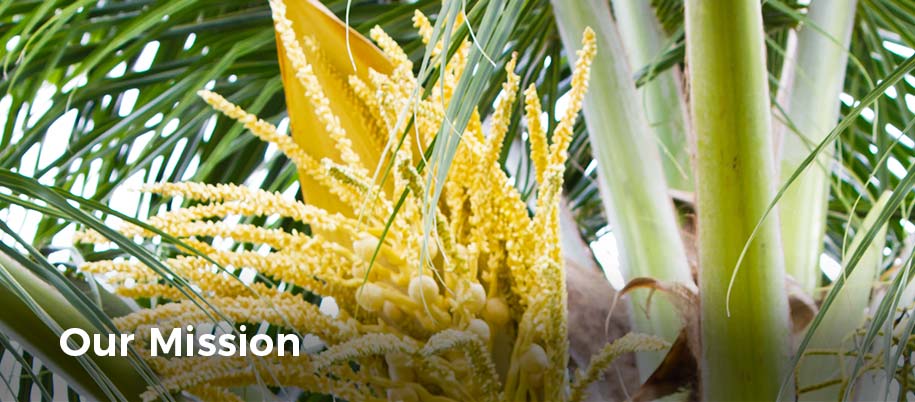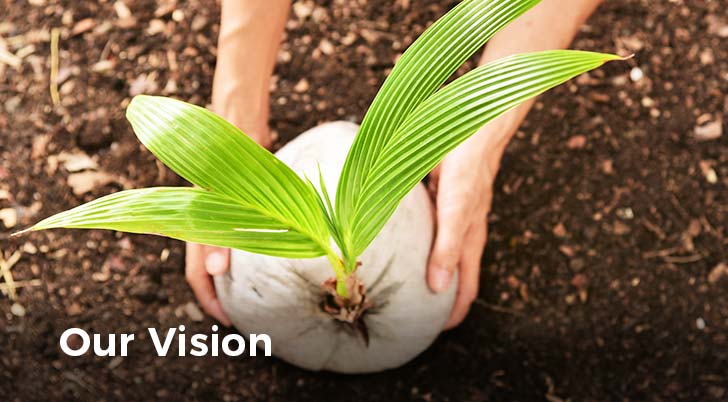At the farm level, Regenerative Organic practices are
carried out to reduce the consumption of water. This
also has a positive impact on CO2 levels.
The by-products generated from the processing operation are used on-site or sold as raw materials for different value additions.
Coconut husks are sold to village entrepreneurs to produce fibre and chips for the export market.
Coconut shells are used to fire the in-house boiler in a bid to reduce the use of fossil fuel.
Seed cake is exported or sold as animal feed.
Coconut water is used to produce energy drinks for the export market.
Treated wastewater is used for irrigation of vegetable and fruit plots within the factory premises.
We believe that it is essential to promote and develop village level entrepreneurs. Hence, we ensure that all our waste and by-products
are sold to registered parties engaged in value added processing. Through our audit process, we eliminate intermediaries and the by
products are sold at a fair price.
We use eco-friendly packing material wherever practically possible.
Almost all our packing materials are recyclable or reusable, and we
have a system established to divert all accumulated packing material
to places where they can be recycled or reused.
Ultimately, all these efforts feed back into our ethos of regenerative
integrity. Our regenerative practices are wide-ranging, being
inclusive of and not limited to cover cropping; mulching as a means
of water conservation and soil conservation; intercropping and
perennial inter cropping as a means of biodiversity; inventorying
flora, fauna, and other species inclusive of insects at farm level; and
monitoring of threatened and endangered species within the project
region.
Ultimately, all these efforts feed back into our ethos of regenerative
integrity. Our regenerative practices are wide-ranging, being
inclusive of and not limited to cover cropping; mulching as a means
of water conservation and soil conservation; intercropping and
perennial inter cropping as a means of biodiversity; inventorying
flora, fauna, and other species inclusive of insects at farm level; and
monitoring of threatened and endangered species within the project
region.


Banana, pineapple, ginger, cinnamon and other inter crops grown between coconut trees to increase biodiversity, reduce pest pressure, and promote sequestration of CO2 into the soil.
Because crops are planted more densely, also generates additional income per acre for farmers.
Bee keeping to encourage pollination of main and inter crops and to support natural habitats.


Productive seedlings placed in between existing trees to receive sufficient sunlight.
Once seedlings are old enough to produce nuts, the neighbouring ageing trees are removed.


Produced and supplied >33 million kg of compost to our farmers at subsidized prices, spending over $450,000.
With our support, some farmers now produce their own compost on-site.
Over half of our farmers allow cattle to graze on their coconut estates—helping to convert weeds and grass into manure, stimulate growth of plant roots, and sequestration of CO2 into biomass.


Vegetative cover with a ground canopy of perennial grasses and other cover cropping species.
Mulching with weeds, leaves, coconut fronds and coconuts husks.
Adding contour drains/bunds.
Burying spongy coconut husks in pits around trees.


Some of our farms have thick canopies, high species diversity, and high biomass generation reducing soil erosion.
In such farms, we observe recycling of leaf litter, sustainability of soil fertility, reduced soil erosion, and improved food security.
Our innovative and comprehensive agroforestry project.


Ensuring traceability of product through personal, verifiable, and transparent relationships with farmers.
Maintaining organic integrity through stringent measures-e.g., GPS-monitored lorries-to avoid commingling at farm, in transit, or in storage.


To help our contract growers improve the fertility and profitability of their estates through natural methods. To be a catalyst of rural development in our host community and our entire project region-in respectful cooperation with our staff, growers and the community at large.
To conceive, develop and produce novel, high-quality value added coconut based products that demonstrate the versatility of this renewable resource. To demonstrate to customers and consumers that operating under our “organic and fair trade” mandate is compatible with the professional and profitable operation of a business.


To be the world’s foremost supplier of certified organic and fair trade coconut products, thus giving our shareholders and customers a reliable, environmentally sustainable and socially responsible source of raw material for their food and body care products.
